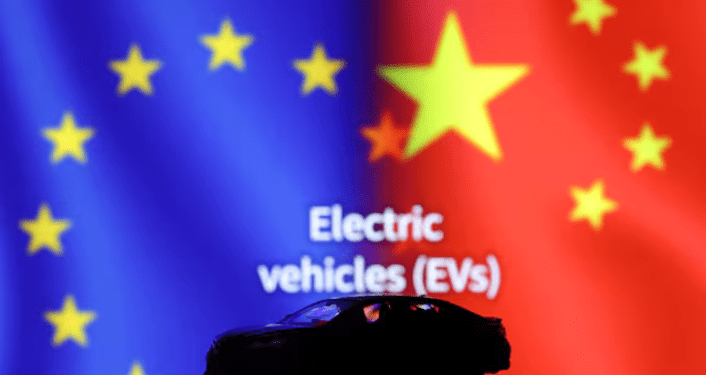Tensions between China and the European Union (EU) have intensified over new tariffs on Chinese electric vehicles (EVs). Chinese President Xi Jinping recently called incoming European Council President Antonio Costa to congratulate him, just hours before the European Commission announced substantial tariffs on Chinese-manufactured EVs. These tariffs, ranging up to 37.6%, are a response to accusations that China’s state subsidies give its EV firms an unfair advantage in global markets. This move signifies Europe’s growing protective stance against China’s production-focused economic model, which it fears could flood its markets with inexpensive goods amidst weak domestic demand.
President Xi emphasized China’s commitment to strengthening its strategic partnership with the EU, highlighting Europe’s pivotal role in a multipolar world order. Despite China denying allegations of unfair subsidies, tensions have escalated. The impending tariff decision will test EU cohesion, with Germany, whose automotive industry heavily relies on Chinese sales, advocating against the tariffs, while France remains a firm supporter.
China has responded by initiating anti-dumping investigations into European brandy and pork imports, seen as strategic measures to influence EU member states’ positions on the tariffs. These investigations highlight the complex dynamics of economic competition and geopolitical strategy between the two major global powers.
The relationship between China and the EU has evolved significantly, encompassing trade, investment, and geopolitical cooperation. China is the EU’s second-largest trading partner after the United States, with bilateral trade volumes reaching hundreds of billions of euros annually. The EU has long been a destination for Chinese exports, ranging from electronics and machinery to textiles and now electric vehicles.
However, tensions have surfaced as the EU grows increasingly concerned about the economic practices underpinning China’s rapid industrial growth. A primary point of contention is China’s alleged use of state subsidies to bolster its industries, thereby undercutting competitors in international markets. This issue has become particularly acute in sectors like automotive manufacturing, where Chinese companies have made significant strides in electric vehicles.
The European Commission’s decision to impose tariffs on Chinese electric vehicles follows an investigation into alleged unfair trade practices. These tariffs, ranging from 7.6% to 37.6%, aim to level the playing field and prevent market distortions caused by state subsidies. These measures are part of broader efforts by the EU to protect its markets from practices that could undermine European industries.
For China, the tariffs represent a significant setback, particularly as it seeks to expand its influence in global electric vehicle markets. Chinese automakers have aggressively promoted their EV technologies, aiming to capitalize on the global shift towards cleaner and more sustainable transportation solutions. The imposition of tariffs complicates China’s export strategies and strains diplomatic relations with the EU, a crucial economic partner.
In response to the tariffs, China has vehemently denied allegations of unfair subsidies and criticized the EU’s decision as protectionist. President Xi Jinping’s reaffirmation of China’s commitment to the comprehensive strategic partnership with the EU underscores Beijing’s desire to maintain stable and mutually beneficial relations. Despite the trade tensions, China continues to emphasize cooperation on global issues such as climate change, where both China and the EU have aligned interests in promoting green technologies and reducing carbon emissions.
Simultaneously, China has employed strategic maneuvers to exert pressure on EU member states regarding the tariffs. The initiation of anti-dumping investigations into European brandy and pork imports serves as a clear signal of China’s readiness to escalate economic tensions if necessary. By targeting key exports from countries like France and Spain, China aims to influence the political calculus of EU decision-makers, potentially swaying opinions on contentious trade policies.
The EU’s decision on electric vehicle tariffs will test its internal cohesion, with member states like Germany and France holding divergent views on the issue. Germany, home to influential automotive manufacturers heavily invested in the Chinese market, has voiced concerns about the potential repercussions of tariffs on bilateral trade relations. In contrast, France, which has historically supported stringent trade measures against perceived unfair practices, remains steadfast in its endorsement of the tariffs.
The outcome of the EU’s deliberations will have broader implications for global trade dynamics, especially amidst growing geopolitical tensions and economic uncertainties. As the EU navigates its stance on China, balancing economic interests with regulatory integrity and geopolitical strategy becomes increasingly complex. Moreover, the EU’s approach to handling trade disputes with China sets precedents for its engagements with other major economies, shaping the future landscape of international trade relations.
The escalation of tensions over electric vehicle tariffs between China and the EU underscores the complexities of modern global trade dynamics. At stake are not only economic interests but also geopolitical influence and regulatory integrity. As both sides navigate these challenges, the decisions made in the coming weeks will reverberate across industries and continents, shaping the contours of international trade relations in the 21st century. Finding common ground amidst divergent economic strategies remains a daunting yet essential task for fostering sustainable global economic growth and cooperation.
















